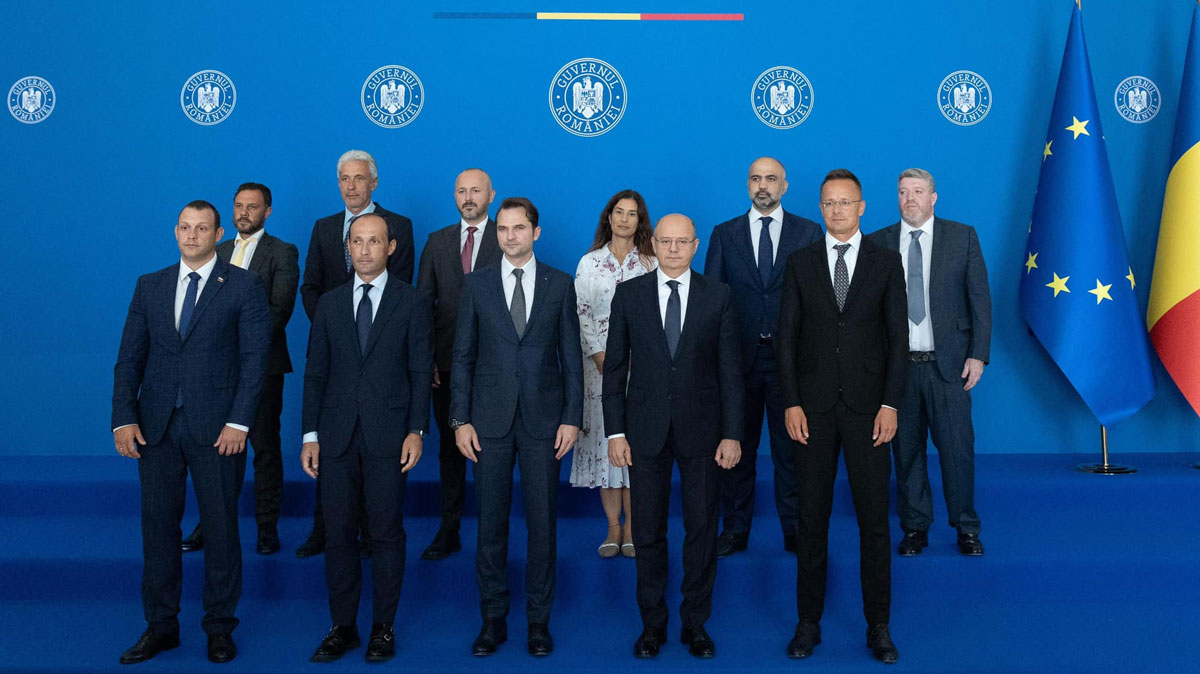Green Energy Corridor: Pillar of Energy Stability and Security in the Region
Victoria Palace recently hosted the 8th Ministerial Meeting of the Green Corridor for the development and transmission of green energy from Azerbaijan through Georgia, Romania and Hungary. Romania has also scored a major diplomatic victory by getting the agreement of member states to set up in Bucharest the headquarters of the project company that will implement this investment in the coming years. This is the result of negotiations held by the Romanian Ministry of Energy team at previous ministerial meetings.
The meeting was hosted by Energy Minister Sebastian-Ioan Burduja and Secretary General of the Government Mircea Abrudean. On behalf of the Ministry of Research, Innovation and Digitization, the Undersecretary of State Marius Posa participated. The foreign delegations were led by Azerbaijani Energy Minister Parviz Shahbazov, Georgian First Vice Prime Minister and Minister of Economy and Sustainable Development Levan Davitashvili, Hungarian Minister of Foreign Affairs and Trade Péter Szijjjártó, Bulgarian Deputy Energy Minister Georgi Samandov, and the representative of the European Commission’s Directorate-General for Energy Cyril Loisel. Transelectrica CEO Stefanita Munteanu and the management of Georgian State Electrosystem, AzerEnerji and MVM Electrical Works, national electricity transmission operators from the other countries, also attended the event.
Transelectrica, Georgian State Electrosystem, AzerEnerji and MVM Electrical Works have signed the articles of incorporation of the Romanian-based Green Energy Corridor Power Company, which will implement the Green Corridor project, a high-voltage direct current submarine cable connecting Romania and Georgia via the Black Sea, with the connection being extended to Hungary and Azerbaijan. It makes an essential contribution to strengthening national and regional energy security, increasing connectivity in the Black Sea basin, diversifying sources of supply, harnessing the potential of renewable energy production and increasing the share of renewable energy in the national energy mix.
“This energy infrastructure project is of major importance for Romania, the region and the European Union. It will interconnect energy markets in the Black Sea area, ensuring diversity of supply. Diversity of supply sources primarily leads to greater energy security and lower energy prices for all consumers. The project will also help decarbonize the energy sector, as it will mainly transport energy from renewable sources. There are many complementarities between our countries, which leads us to this joint effort to build a large-scale project that we all need. It is also an important diplomatic victory for Romania, which will host the project company, assuming its leading role in the regional energy sector. The project was launched in December 2022 in Bucharest. I congratulate Transelectrica on today’s ambitious step. The first results of the feasibility study for this investment will be presented in Baku at COP29 in November,” Sebastian-Ioan Burduja said.
The Green Corridor project is backed by the European Commission, with European Commission President Ursula von der Leyen personally attending the signing of the agreement between the parties at the Cotroceni Palace on December 17, 2022. The European Commission also participated in all ministerial and technical meetings.
On September 3, the energy ministers of the four countries signed a protocol amending the agreement, which clarifies that European law and the obligations stemming from Romania and Hungary’s membership take precedence over the agreement.
Moreover, by joining the Ministry of Research, Innovation and Digitization, the feasibility study will assess the possibility of including a new component in the feasibility study, namely a fiber optic cable that will connect the four countries also in terms of data flows. In the next period, solutions to implement this development will be identified.
Last but not least, the possibility of Bulgaria joining the feasibility study and infrastructure project was discussed.
Romania is taking a long-term vision for energy development. The Green Energy Corridor is an essential project through which our country will become a pillar of stability and energy security in the region.



